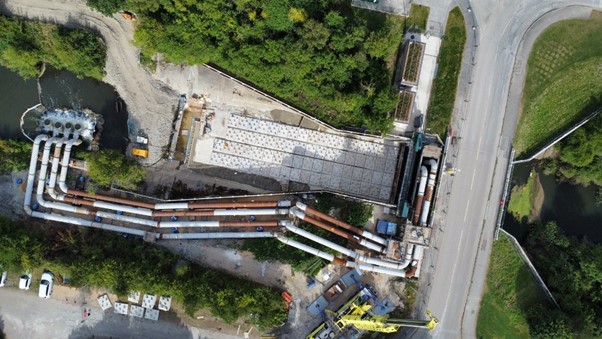The Meadowgate Regulator scheme demonstrates how technical ingenuity and forward-thinking design can transform asset renewal into a benchmark for climate resilience and ecological restoration. Delivered within the live environment of Rother Valley Country Park, the project combined a global-first full-width modular fish pass with the UK’s largest temporary syphon solution—pioneering a new standard in low-carbon construction and river connectivity.
Replacing a life-expired bottom-hinged gate with a dual-drive, remote-operated vertical sluice, the project removed in-channel obstructions while enhancing operational resilience. This unlocked the opportunity to restore fish migration routes, reconnecting 4.6 km of fragmented river habitat along the River Rother.
Through advanced Computational Fluid Dynamics (CFD) modelling, the team developed 80No. bespoke precast concrete ‘fish tiles’ (2.5 m x 2.0 m) with varying upstand heights (400mm and 50mm) to create turbulence and reduce flow velocities below 1 m/s with a minimum depth of 0.2m, supporting migration of coarse fish, European eel, brown trout, lamprey, and large migratory salmonids and meeting Eel Regulations 2009 and Water Framework Directive (WFD) requirements.
To safely deliver the works, a 110 m-long syphon system was designed to pass 12 m³/s of flow, achieving an 86% carbon saving (1,002 tCO₂e) and avoiding 270,000 litres of diesel use compared to conventional methods. The system was enhanced by a bespoke Python-based flood forecasting tool, providing 48-hour risk alerts to safely programme in-channel works.
Three Winning Facts:
- Global-first full-width modular fish pass
- UK’s largest temporary syphon solution, saving 1,002 tCO₂e
- Bespoke flood forecasting tool providing 48-hour lead on high flow events

